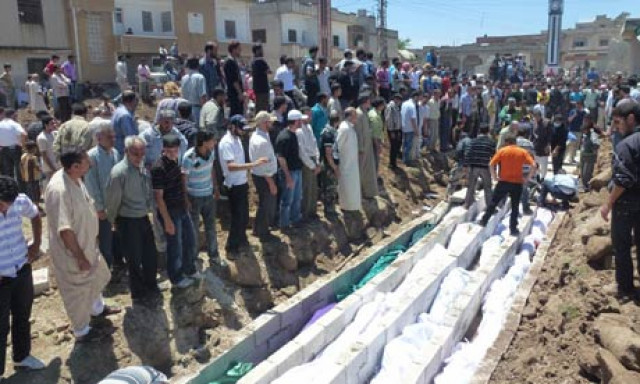Air strike as UN blames Syria for crimes against humanity
UN investigators said Wednesday the Syrian regime has committed crimes against humanity.

Regime forces were also bombarding the key battleground city of Aleppo in the north, activists said, while Damascus was shaken by a bomb attack targeting military headquarters and a firefight near the prime minister's office.
A report by the UN Commission of Inquiry said government forces and their militia allies committed crimes against humanity including murder and torture, while the rebels have also carried out war crimes, but on a lesser scale.
The report was issued as pressure mounted on President Bashar al-Assad's embattled regime with the world's largest Muslim body poised to suspend Syria over the unrelenting violence, following a similar move by the Arab League.
"The commission found reasonable grounds to believe that government forces and the shabiha had committed the crimes against humanity of murder and of torture, war crimes and gross violations of international human rights law and international humanitarian law," the report said.
It said they were responsible for the massacre in the central city of Houla in May when 108 civilians, including 49 children, were killed in a grisly attack that Assad himself had said was the work of "monsters".
Rebel fighters were however not spared in the probe, which found them guilty of war crimes, including murder, extrajudicial execution and torture.
In the north, activists and residents reported another atrocity by the regime on Wednesday, with at least 23 people including children killed in an air strike in Aazaz, a rebel bastion near the second city Aleppo.
"Bashar did this. God help us, these animals will kill us all," said one man, hoisting a bloodied arm from a pile of body parts on the pavement outside the local hospital.
The Syrian Observatory for Human Rights said 23 people were killed, including women and children, and another 200 wounded, warning the toll could rise.
"There are many people still trapped under the rubble," said Observatory director Rami Abdel Rahman. "The situation is horrific."
Dozens of residents were seen fleeing for nearby Turkey, many of them entire families carrying boxes of clothing and food on their heads.
In all at least 88 people were killed Wednesday in Syria, where more than 23,000 people have died since the uprising against the regime erupted in March 2011, said the Observatory.
In Damascus, the FSA claimed a bomb attack targeting a military headquarters near a hotel used by UN observers, saying it was a warning that it could strike anytime at the very heart of the regime.
A gunbattle also erupted between rebels and troops near the offices of new Prime Minister Wael al-Halqi.
Damascus has been rocked by several bomb blasts since the start of the increasingly brutal conflict, including a July attack also claimed by the FSA that killed four top security chiefs in a major body blow to the regime.
Wednesday's attack came a day after former premier Riad Hijab, the highest profile government figure to defect, said the regime had collapsed and only controlled 30 percent of the country.
And visiting UN humanitarian chief Valerie Amos meanwhile warned that the situation in Syria was getting worse, with the number of people in need possibly has high as 2.5 million
In Mecca, the Organisation of Islamic Cooperation was set to follow the Arab League in suspending Syria in a move -- vehemently opposed by Iran -- which is aimed at further isolating Assad's regime but is seen as largely symbolic.
A final draft statement says Syria should be suspended over "the obstinacy of the Syrian authorities in following the military option" and the failure of a peace plan brokered by outgoing international envoy Kofi Annan.
But fresh comments by Russia and the US exposed the deepening rifts between world powers over how to tackle the conflict.
Russian Foreign Minister Sergei Lavrov said Moscow would not let the West "sabotage" a political transition accord agreed in Geneva in June and accused Western states of fomenting violence by openly supporting the armed rebellion.
World powers had agreed on a Russian-backed transition plan that did not make an explicit call for Assad to quit, although the West insists it sees no future role for the man who has ruled Syria with an iron fist for 12 years.
But the US rejected Lavrov's accusations, in an exchange that came a day before Wendy Sherman, the number three at the State Department, holds talks in Moscow expected to focus on Syria and nuclear tensions with Iran.
A Russian official also said Moscow wanted to keep the UN monitoring mission operating in some form after its mandate expires on August 19, warning that a withdrawal would have "serious negative consequences".
China, which along with Russia has blocked three UN resolutions on Syria, also accused Western powers of hampering efforts to end the conflict, as a senior Damascus envoy visited Beijing for talks.
With the future of Syria crucial to the military and geopolitical balance in the region, the conflict is exposing deep rivalries and political power games between both regional and international players.
And on Tuesday, US Defence Secretary Leon Panetta accused Iran's elite Revolutionary Guards of trying to develop a militia within Syria to fight for the regime.



















COMMENTS
Comments are moderated and generally will be posted if they are on-topic and not abusive.
For more information, please see our Comments FAQ